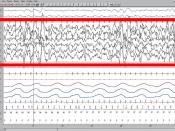Studies about sleep have been going on for many years, but we are still a long ways off from knowing everything there is to know about sleep and how it affects the human body. The Ancient Greeks, one of the first to study sleep, believed that it was a gift to be granted, or refused by the god Morpheus. Like the Ancient Greeks much of our previous studies were mere speculation, with observation being the only tool available for the study of sleep. That is until the development of the electroencephalograph, or EEG.
The EEG measures brain waves through the release of minute bursts of electricity. It is through the use of the EEG and other important tools that have been developed, that we have just recently been able to learn about sleep and how it affects the human body. We now know that there are between four and five stages of sleep.
Our normal, awake brain waves are called beta waves. Alpha waves are when we are in a relaxed, drowsy state called pre-sleep. During stage one of sleep, our heart rate slows, blood pressure decreases and we can be easily awakened. In stage two we become more relaxed, less responsive and sleep spindles start to appear on an EEG. It is in stages three and four that sleep walking may occur, and our brain is sending out delta waves, and we are very hard to awaken. REM (rapid eye movement) sleep is a signal that we may be dreaming and it is during REM sleep that a muscle paralysis occurs. Also during REM sleep, our memory circuits are activated and it is felt that this plays a role in our learning and also is important for memory consolidation.
Although there is no known single specific...


